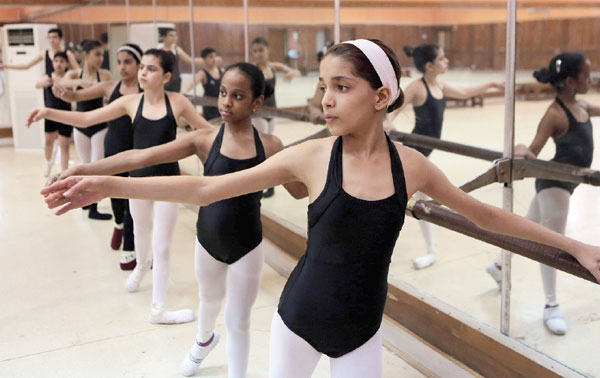School of performing arts survives in Baghdad
Ann Khalid did not feel well, but she insisted on dancing a brief scene from Tchaikovsky's Swan Lake with her classmates. The 12-year-old is determined to one day have a career both dancing and teaching ballet, not an easy path in a country torn by conflict.
"My school and my church are the two things I love the most in Baghdad," the soft-spoken Khalid, in her black leotard and white ballet shoes, said with pride after the dance.
If she has a shot at her dream, it's because of the Baghdad School of Music and Ballet. The school has managed to survive decades of turmoil, a feat that speaks to the resilience of Baghdad's residents through war after war. The Iraqi capital's past as a Middle East center of culture is a distant memory, but the school has carved out an island of artistic pursuit amid the violence that is an inescapable part of daily living and the constraints imposed in the name of religion that now define public life.
"Where else in Iraq can you walk into a school and listen to a small boy playing Antonio Vivaldi on his violin?" boasts the principal, Ahmed Salim Ghani, himself a virtuoso player of the contrabass and the oud, an Arab instrument resembling the lute.
Another rarity: It isn't segregated by sex like almost all other Iraqi schools. Male and female students take classes together from kindergarten to high school.
Ghani proudly declares himself a "genuine" Baghdadi. He speaks nostalgically about the city's golden age - the 1960s through to the 1980s. Back then, its elite patronized art and culture. Secular governments ensured that enough of the nation's oil wealth went to the arts. The school, which was founded in 1968, thrived.
Things rapidly worsened for Baghdad and the school with Iraq's 1990 invasion of Kuwait. UN sanctions devastated the economy, ruptured the nation's social fabric and forced hundreds of thousands to leave their homes in rural areas. They descended on the city to find work, bringing with them the conservative traditions of their villages.
With state coffers emptying, Russian instructors who had come to Baghdad were sent home.
The religiosity that pervades Baghdad's society has had a powerful effect. The school now has around 500 students. But many parents pull their daughters out of ballet when they are 12 or 13 because they object on religious grounds to the girls being lifted and embraced by boys their age while performing, according to Zeina Akram Fayzy, a 40-year-old ballet instructor.
"Years of our hard work go to waste," lamented Fayzy, a graduate of the school. "The school needs talented children who stay the course."
Khalid, the 12-year-old, says the moral questions surrounding dance don't dent her enthusiasm.
"Everyone says it is haram (religiously prohibited) and disgraceful. But my parents are happy for me to dance," she said. She's the daughter of artistic parents��her father is an actor and her mother a television director.
|
Students practice at the Baghdad School of Music and Ballet in Monsur district in Baghdad, Iraq. The school has managed to survive decades of turmoil, a feat that speaks to the resilience of Baghdad's residents through war after war. Khalid Mohammed / Associated Press |
(China Daily 11/21/2014 page10)















